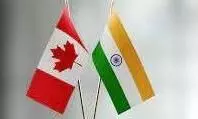
Indian envoy labels Canadian MPs' interference allegations as politically motivated
text_fieldsIndia has dismissed allegations by Canadian legislators of foreign interference as politically motivated and influenced by Sikh separatists.
This development further strains already tense bilateral relations between the two nations.
Last month, a group of Canadian parliamentarians, citing intelligence reports, claimed some elected officials had been "witting or semi-witting" participants in foreign interference operations. They identified India and China as major threats to Canada's democratic institutions.
Sanjay Kumar Verma, India's envoy to Canada, rejected the report as biased and lacking fair hearing or cross-examination opportunities for India. He argued that the accusations were influenced by anti-India elements and lacked solid evidence.
"This is all politically motivated...if Canadian institutions are bent upon harming bilateral relations with India, that will happen," Verma told Reuters. He emphasized the need for infallible evidence, which he claimed the report did not provide.
The report, which has spurred demands from opposition legislators for the government to identify those under suspicion, represents India's first formal response. It comes amid ongoing accusations from New Delhi that Canada harbors Khalistani terrorists.
In June 2023, Prime Minister Justin Trudeau alleged credible evidence of Indian government involvement in the murder of Sikh separatist leader Hardeep Singh Nijjar in British Columbia. Verma suggested that Khalistani terrorists had influenced the Canadian parliamentary process.
The special committee that produced the report responded to Verma's criticism by asserting its independence and thoroughness, having consulted the country’s intelligence agencies, police service, public safety ministry, and reviewed 4,000 documents.
The World Sikh Organization of Canada condemned Verma's remarks as "baseless and unprofessional," supporting the committee's independence.
Canada is urging India to cooperate with the investigation into Nijjar's murder. Despite media reports of Canadian intelligence officials visiting India twice this year, Verma stated that Canada had not shared any evidence with India.
In the wake of the murder, Canadian police arrested and charged four Indian men. The incident also led Canada to pause trade talks on a proposed comprehensive economic partnership agreement, which had been in discussion since 2010.
Verma indicated that India would consider resuming trade talks if Canada initiates the request. Despite the diplomatic friction, bilateral trade in goods and services exceeded $25 billion last year and is expected to grow this year.























